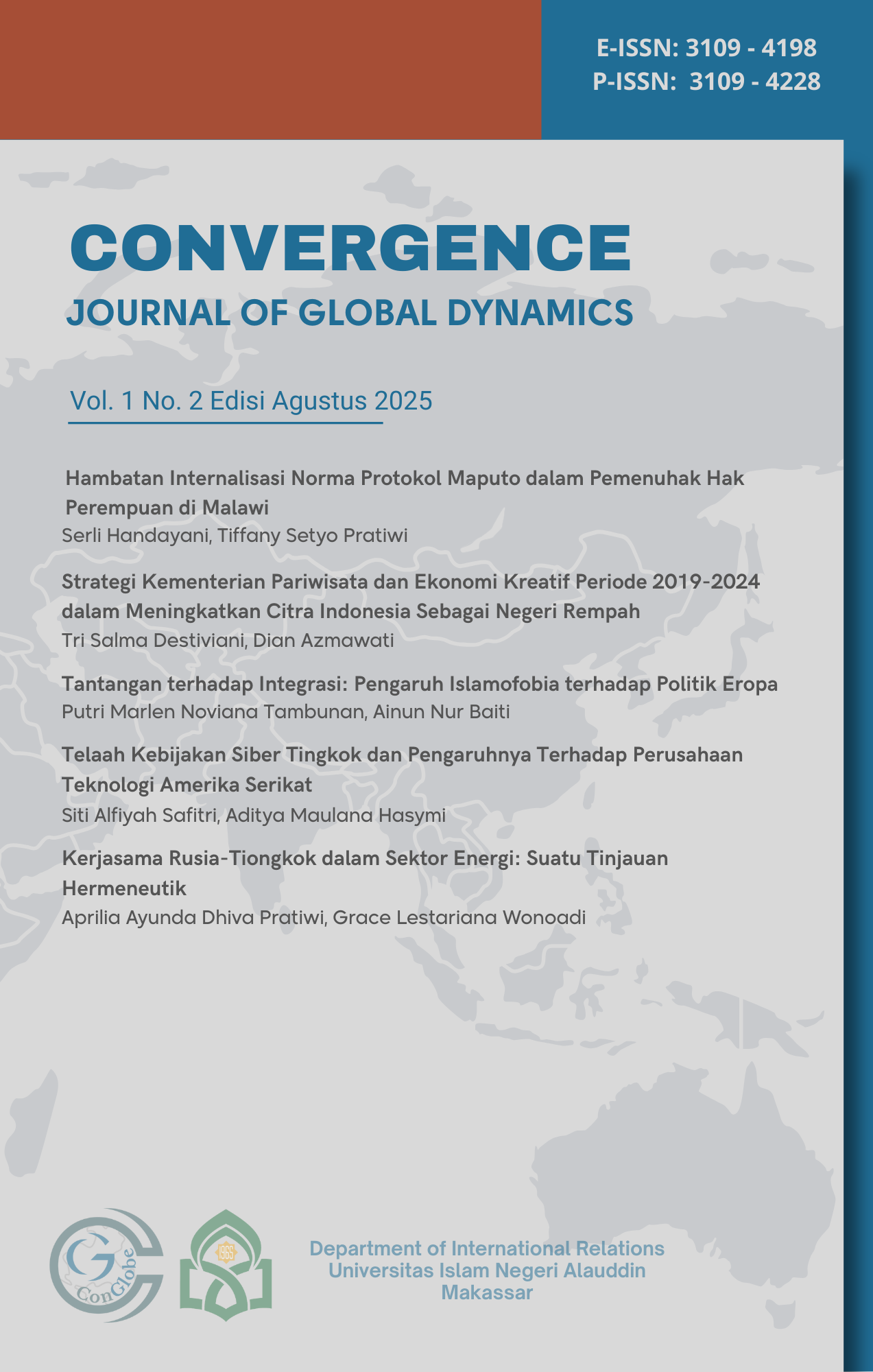HAMBATAN INTERNALISASI NORMA PROTOKOL MAPUTO DALAM PEMENUHAN HAK PEREMPUAN DI MALAWI
Keywords:
Internalization of Norms, Malawi, Maputo Protocol, Women's RightsAbstract
Malawi is one of the African Union member states that ratified the Maputo Protocol as an effort to fulfill women's human rights. This study aims to explain how the Maputo Protocol norms are internalized in Malawi through three stages: norm emergence, norm acceptance, and norm internalization. Furthermore, this study will analyze the obstacles to the implementation of the Maputo Protocol at the community level. This study uses a qualitative research method with data sources through secondary data derived from journal articles, online news, and data from official government websites. The findings of this study indicate that the internalization of the Maputo Protocol is demonstrated by Malawi's actions in formalizing the formation of new laws in 2006, namely the Law on the Prevention of Domestic Violence, the Law on Inheritance of 2011, the Law on Gender Equality of 2014, and the Constitutional Amendment Law Number 36 of 2017. Internalization is also demonstrated by the institutional governance process in the government that is oriented towards gender equality policies. However, this study found that obstacles in the internalization of the Maputo Protocol norms at the community level are still very large. These obstacles stem from the lack of public knowledge about the Maputo Protocol. More specifically, this study highlights the government's inability to legalize medical abortion as part of implementing the values of the Maputo Protocol. This situation is driven by the complexity of the conceptual frameworks of religious and cultural leaders in Malawi regarding abortion, which is considered a "grave sin", which has implications for political dynamics, where Malawi's political elite considers the opinions of religious leaders as a key basis for policy decisions.
References
Amnesty International. (2004). The Protocol on the Rights of Women in Africa: Strengthening the promotion and protection of women’s human rights in Africa, 2–5. Retrieved from https://eur-lex.europa.eu/legal-content/PT/TXT/PDF/?uri=CELEX:32016R0679&from=PT%0Ahttp://eur-lex.europa.eu/LexUriServ/LexUriServ.do?uri=CELEX:52012PC0011:pt:NOT
Asuagbor, J. L. (2016). Status of Implementation of the Protocol to the African Charter on Human and People’s Rights on the Rights of Women in Africa Commissioner, Special Rapporteur on the Rights of Women in Africa (African Commission on Human and Peoples’ Rights) 60 TH MEETING. New York. Retrieved from https://reliefweb.int/report/world/status-implementation-protocol-african-charter-human-and-people-s-rights-rights-women
Carneau, F. (2016). The Protocol on the Rights of Women in Africa : Promises and Challenges after thirteen years, 1–9. Retrieved from https://www.academia.edu/33311660/Maputo_Protocol#loswp-work-container
Centre for Solution Journalism (Blantyre). (2024). Malawi: Enact Termination of Pregnancy Bill to Reduce Maternal Morbidity and Mortality. Retrieved from https://allafrica.com/stories/202409270375.html
Chalira, N., & Ndimurwimo, L. A. (2018). Violence Against Women: A Comparative Analysis Between Malawi and South Africa. Retrieved from https://www.saflii.org/za/journals/SPECJU/2018/9.pdf
D’Orsi, C. (2021). Are Africans States Willing to Ratify and Commit to Human Rights Treaties ? The Example of the Maputo Protocol. Retrieved from https://www.erudit.org/en/journals/rqdi/2021-rqdi06201/1079427ar.pdf
Dugis, V. (2016). Teori Hubungan Internasional Perspektif-Perspektif Klasik. (Vinnsenio Dugis, Ed.), Cakra Studi Global Strategis (CSGS. Cakra Studi Global Strategis (CSGS). Retrieved from https://share.google/o1ddwvPaji7Zkg8flx
Equality Now. (2020). Litigating the Maputo Protocol: A Compendium of Strategies and Approaches for Defending the Rights of Women and Girls in Africa. Retrieved from https://docslib.org/doc/13313471/litigating-the-maputo-protocol-a-compendium-of-strategies-and-approaches-for-defending-the-rights-of-women-and-girls-in-africa
Finnemore, M., & Sikkink, K. (1998). International Norm Dynamics and Political Change. Theories of International Relations, 139–174. https://doi.org/10.4324/9781315236339-14
Holmes, G. (2020). Feminist institutionalism. ResearchGate, (August), 56–67. Retrieved from https://share.google/PPWXsnVjRHVTdNMV7
Ipas. (2020). Meet Tisungane Sitima, Malawi youth activist working to safeguard reproductive health services during COVID-19. Retrieved from https://www.ipas.org/news/meet-tisungane-sitima-malawi-youth-activist-working-to-safeguard-reproductive-health-services-during-covid-19/
Ipas Malawi. (n.d.). Business unusual: youth take leadership role in safe abortion advocacy. Retrieved from https://hivos.org/document/business-unusual-youth-take-leadership-role-in-safe-abortion-advocacy/
Johnson, S. (2025). ‘I’ve seen women suffer’: Malawi’s religious leaders fight for legal abortions. Theguardian.Com. Retrieved from https://www.theguardian.com/global-development/2025/jan/09/women-malawi-religious-leaders-legal-abortion-ban-maternal-mortality-christian-muslim
Maina, M. (2020). Malawi’s Religious Leaders Contest Proposed Abortion Law, Threaten Unspecified Action. Retrieved from https://www.aciafrica.org/news/2000/malawis-religious-leaders-contest-proposed-abortion-law-threaten-unspecified-action
Masina, L. (2011). New Study Encourages Abortion Reform in Malawi. Retrieved from https://www.voanews.com/a/new-research-encourages-push-for-abortion-reform-in-in-malawi-136475758/161399.html
Mwanjawala, P. E. (2020). The Invented Tradition: Hastings Kamuzu Banda and the Marginalization of Women in Malawi, 1996-1994. Miami University, 47–58. Retrieved from https://www.researchgate.net/profile/Patrick-Mwanjawala
Omondi, S. (2018). Breathing Life into the Maputo Protocol: Jurisprudence on the Rights of Women and Girls in Africa. Equality Now, (January), 7–8. Retrieved from https://share.google/B7WULiivjauOrJWtT
Pretoria University Law Press. (2016). The impact of the African Charter and Maputo Protocol in selected African states. In V. O. Ayeni (Ed.), Pretoria University Law Press (pp. 149–163). South Africa: Pretoria University Law Press (PULP). Retrieved from https://www.maputoprotocol.up.ac.za/images/files/documents/addittional_documents/2016_The_impact_of_the_African_Charter_and_the_Maputo_Protocol_in_selected_African_states.pdf
Pretoria University Law Press. (2023). The Impact of the Maputo Protocol in Selected African States. In A. B.-S. and D. M. Susan Mutambasere (Ed.) (pp. 189–210). South Africa. Retrieved from https://www.pulp.up.ac.za/latest-publications/the-impact-of-the-maputo-protocol-in-selected-african-states
Purnomo, S. P. & A. (n.d.). Konstruktivisme Dalam Studi Hubungan Internasional: Gagasan dan Posisi Teoritik. Garuda.Kemendikbud.Go.Id. Retrieved from https://share.google/TuEHONQRzx1G78nOl
Republic of Malawi. (2013). Republic of Malawi Report to the African Commission on Human and Peoples’ Rights Implementation of the African Charter on Human and Peoples Rights. Retrieved from https://www.maputoprotocol.up.ac.za/images/files/countries/state_reporting_english/Malawi. Initial and Combined Reports, 1995 - 2013. State Report.pdf
Sigsworth, R., & Kumalo, L. (2016). Women , peace and security Implementing the Maputo Protocol in Africa. Institue for Security Studies. Retrieved from https://issafrica.org/research/papers/women-peace-and-security-implementing-the-maputo-protocol-in-africa
Solidarity for African Women’s Rights Coalition (SOAWR). (n.d.). About the SOAWR Coalition. Retrieved from https://www.soawr.org/about-us/about-soawr/
Solidarity for African Women’s Rights Coalition (SOAWR), Equality Now, & Make Every Woman Count (MEWC). (2023). Twenty Years of the Maputo Protocol: Where are we now? Retrieved from https://equalitynow.org/resource/twenty-years-of-the-maputo-protocol-where-are-we-now/
Sturges, P. (1998). The Political Economy of Information: Malawi Under Kamuzu Banda, 1964-1994. Academia.Edu, 1–11. Retrieved from https://www.academia.edu/53122186/The_Political_Economy_of_Information_Malawi_Under_Kamuzu_Banda_1964_94
Wilson, A., & Kachipande, S. (2020). Women in Malawi. Oxford Research Encyclopedia of African History, (July 2020), 1–16. Retrieved from https://oxfordre.com/africanhistory/display/10.1093/acrefore/9780190277734.001.0001/acrefore-9780190277734-e-694?rskey=OfJVpS&result=8




